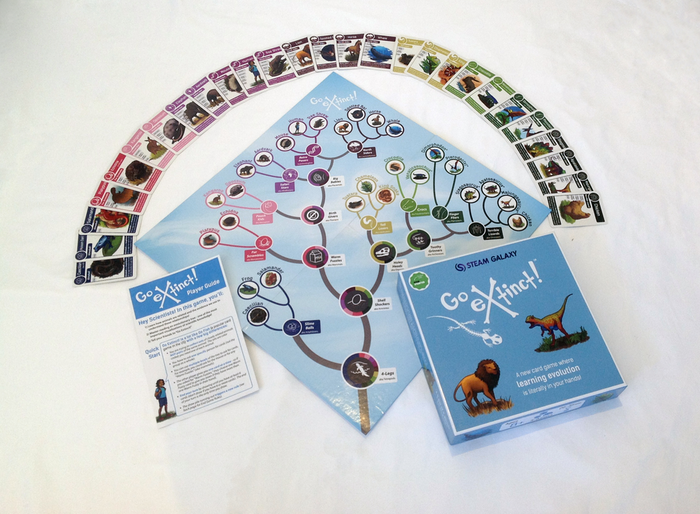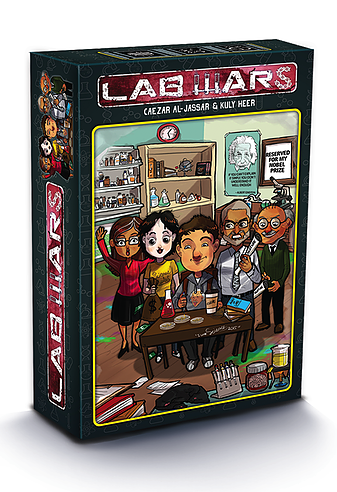From Trivial Pursuit to Monopoly, classic board games are not just fun and social but also present an opportunity to develop critical thinking and cognitive skills as players plot their next move or work out a gameplay strategy. But what if we could take these core elements and use them to teach science? Way ahead of you. Scientists, science educators and board game hobbyists have been doing this for years. And thanks, in part, to the phenomenon of crowdfunding sites like Kickstarter and Indiegogo, there has been an explosion of science-based games aimed at entertaining and educating all ages.

Go Extinct!, for example, is Go Fish but with a twist: you play a zoologist investigating how animals are related. The aim of the game is to collect the most complete clades (groups of organisms that come from a common ancestor). In other words, you are competing to collect as many entire branches as possible on the tree of life.
Board Games: Gotta Catch ‘Em All?
“As a former science teacher, I’m thrilled when a game creator doesn’t just make a science themed game, but one that truly incorporates a concept and gamifies it,” says science communicator Katie McKissick, blogging about her love of science-infused board games on SciAm.com.
What is encouraging about a game like Go Extinct! is that it is not only endorsed by science professionals but it also appears to get the seal of approval from school children. While Stanford biology professor Dr. Elizabeth Hadly described it as fun to play, easy to learn, and “an expression of some really good scientific evidence”, one American 7th grader claimed it was “better than Pokemon”.
Spaced Out
Board games aimed at teaching scientific concepts have become so popular that the journal Nature recently devoted an entire feature to the topic. They interviewed Dante Lauretta, a planetary scientist at the University of Arizona, Tucson. Lauretta, who led NASA’s OSIRIS-Rex, a project designed to retrieve asteroid samples, combined his love of science and board games by creating Xtronaut: The Game of Solar System Exploration.
Xtronaut, like Go Extinct!, started out as a Kickstarter project before going on to win Good Housekeeping Best Family Board Game for 2016. It is now in its second printing and sells through Amazon.com. Its success lies in its broad appeal. Xtronaut can be played by anyone seven years old and upwards and comes with a STEM education workbook while incorporating real space and rocket science and engineering.
The player begins by selecting a mission card. This card determines the type of spacecraft needed, the location, and the amount of Delta-V (velocity) required to complete the mission. As you play you must collect the right amount of rocket parts while avoiding sneaky moves from other players out to thwart your mission by playing a government shutdown card or similar.
[perfectpullquote align=”full” cite=”” link=”” color=”#1AC4A8″ class=”” size=””]The key to Xtronaut’s truly engaging gameplay is an insistence on scientific accuracy by designer and NASA scientist Dante Lauretta.[/perfectpullquote]
The key to truly engaging gameplay, however, was an insistence on scientific accuracy: “For the Xtronaut mission list, I targeted all the key planetary bodies and based the original spacecraft selection on previously flown missions,” Lauretta told GoodCall.com.
Evil Scientists

Learning about space and evolution are fun but there are even board games about the scientific process or what it’s like to be a scientist. Lab Wars pits players against each other in a research laboratory environment where you can play one of five characters including a PhD student or established professor. The aim in this tongue-in-cheek game is not just to gain the best reputation in your field of expertise by carrying out experiments and getting published. It is also a good strategy to beat your colleagues by stealing their work or sabotaging their research!
The game designers even state that “what’s really fun about these cards is they are based on real life events we as scientists have encountered, heard about or researched”. Welcome to the gritty underworld and mean streets of scientific research!
It’s all fun and games until something gets learned
[perfectpullquote align=”right” cite=”” link=”” color=”#1AC4A8″ class=”” size=”19″]Long-term knowledge retention of board game seminar participants is higher than for those who attended a lecture-based seminar[/perfectpullquote]
These games are not just created on a hunch that fusing fun with science will lead to educationally beneficial outcomes. Recent research suggests that board games could be useful supplemental tools to improve knowledge retention. A recent paper published in the scientific journal FEMS Microbiology Letters compared a board game with lecture-based seminars as methods of improving short and long-term knowledge retention in a class of medical pharmacology students learning about antimicrobial drugs. The study found that “long-term knowledge retention of board game seminar participants was higher than those who attended the lecture-based seminar”.
This is a serious business. A quick glance through the literature within fields as diverse as education studies, psychology or cultural studies shows us that scores of papers exist on the potential for board games as educational tools. This potential ranges from teaching numeracy skills to children to assisting medical students with complex concepts, and educating the general public on climate change.
If you are a parent or teacher interested in getting your kids gaming but are not sure where to start there is an excellent US-based website called ScienceGameCenter.org. This website lists all known science board games (and apps) by cost, age group, platform, subject, and developer type (whether the game developers are academics, professional game devs or from the open source community).
